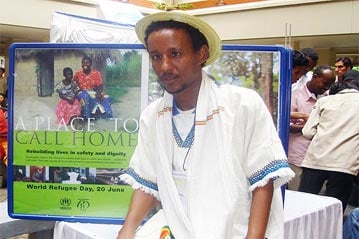Reaping the artistic fruits of working for peace in Colombia
Reaping the artistic fruits of working for peace in Colombia

BARRANCABERMEJA, Colombia, June 20 (UNHCR) - Pedro was just 15 years old when he first torched a bus - his initiation rite on joining one of the numerous irregular armed groups in this major oil and cattle centre.
"I got on the bus and politely asked everyone to get off," Pedro says. "This is an armed strike, I explained, and I advised some frightened schoolgirls who were crying to go home. I was going to school myself - they could have been my friends - but the armed group I was working with asked me to attack the bus."
Pedro's* story is typical of the violent gang-ridden society that thousands of young people in the northern Colombian city of Barrancabermeja grow up in. But Pedro and hundreds of other displaced young people and local youths have found there is more to life, thanks to a UNHCR-backed project that has taught them the joys and creativity of the arts.
Today, World Refugee Day, COMUNARTE will receive the prestigious Van Heuven Goedhart Award, named after the first UN High Commissioner for Refugees. The cash prize, which will be presented in Amsterdam, is awarded each year by the Dutch non-governmental organisation, Stichting Vluchteling, and honours those who work with refugees and displaced people.
It is a remarkable accolade for a group set up in Barrancabermeja just three years ago by the Asociación Juvenil de Baile Moderno (Young People's Modern Dance Association) with the help of the UN refugee agency and the local church. It quickly gained the support of local civic and academic groups.
The idea for such a group had been germinating for almost a decade in the mind of Elkin Ramos, a dance enthusiast and disc jockey who had had enough of the violent, dog-eat-dog culture in which he grew up. At the heart of an important cattle-rearing region and home to the country's largest oil refinery, Barrancabermeja is plagued by turf wars between rival gangs and irregular armed groups. The city has been ravaged by selective killings, massacres, extortion, gasoline theft and kidnappings for decades.
"One night, someone started firing a gun in the club I worked for and I felt I had to do something before people died," he says, recalling his 1994 epiphany. "So I called on the members of the rival gangs to confront each other, but through dancing, not bullets. I knew they were good dancers, and it worked. Soon after that, my own gang became a dance group."
It took years of dancing in city parks before Ramos and his Asociación Juvenil de Baile Moderno contacted UNHCR and put forward a proposal to work with young displaced people and the communities in which they live.
"It was clear to us from the start that youngsters, both those who had been displaced and others, were especially badly affected by violence in the cities," says Roberto Meier, UNHCR's representative in Colombia. "That is why it was important that the project should benefit both displaced people and other youngsters who live in the same neighbourhoods and are threatened by the same armed groups. We are very glad that this project, which has done so much to improve the lives of hundreds of young people, is now getting international recognition."
These sentiments are echoed by Father Orlando Olave, who represents the local church on the project. "Whether or not they can paint or dance well is not important. What matters is that they discover a meaning to their lives," he says. The church has made available houses in several areas of the city at which COMUNARTE members can learn and practice dance, painting and drama.
They include people like displaced brothers William and Daniel, who fled to Barrancabermeja when a new armed group took over their region six years ago. They were aged just 12 and 14 at the time, and the forced move interrupted their studies and hopes of joining the legal and medical professions one day.
"We faced rejection and all kind of deprivation," Daniel says, "but with COMUNARTE we found out that we could go on and live a normal life." The brothers write and perform plays, and help newly-arrived displaced kids.
But for all its good work, COMUNARTE has suffered its share of tragedy. Five members of the project have been killed over the years, some because they joined armed groups and others because they refused to join. Last year, the project had to stop temporarily due to a lack of funds.
But the project is above all a story of hope - the theme of this year's World Refugee Day. Aura, a 23-year-old participant, says she will never forget what Ramos once told her. "He taught me that when you do something for others you are planting a seed, and there is always a moment in which everything you planted produces a fruit," she says. That fruit is called COMUNARTE.
By Gustavo Valdivieso in Barrancabermeja, Colombia
* Some names have been changed to protect the identity of those involved






